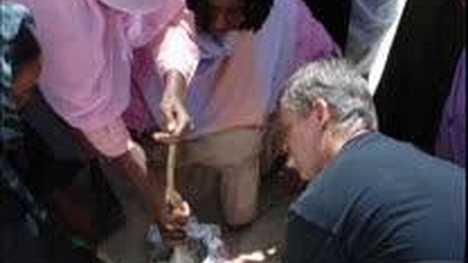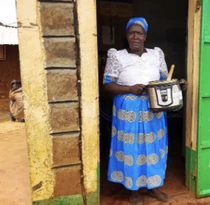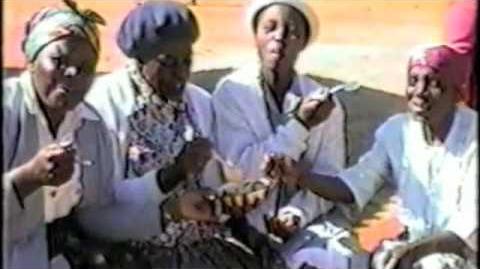Paul Hedrick (talk | contribs) mNo edit summary Tag: sourceedit |
Ben Hedrick (talk | contribs) m (countries fixes) Tag: rte-source |
||
| (6 intermediate revisions by 2 users not shown) | |||
| Line 1: | Line 1: | ||
{{GoogleTranslateLinks}} |
{{GoogleTranslateLinks}} |
||
{{Updated|3|5|15}} |
{{Updated|3|5|15}} |
||
| + | |||
| + | <table cellspacing="2"><tr> |
||
| + | <td valign="top" width="50%">__TOC__</td> |
||
| + | <td valign="top" width="50%" style="padding:10px;"> |
||
| + | [[File:Solar Cooker Workshop in Darfur|none|360px]] |
||
| + | Video showing the [[Darfur Peace and Development Organization]] solar cooking project. This is a solar cooker workshop in Nyala, Darfur. As the women look for firewood around the displacement camps they face the danger of rape and abduction. Solar cooking offers an alternative to using firewood for cooking. |
||
| + | </td> |
||
| + | </tr> |
||
| + | </table> |
||
==Events== |
==Events== |
||
{{CalendarAndPastEvents}} |
{{CalendarAndPastEvents}} |
||
| + | =={{HeadingNews}}== |
||
| − | ==News and Recent Developments== |
||
*'''December 2012: Jewish World Watch, originator of the Solar Cooker Project for Sudanese refugees, reviews their current programs at several of the refugee camps in Chad''' – As a result of a joint security force between [[Chad]] and [[Sudan]], violence against women has declined some since the project began seven years ago. [[Cord]], their partner at the [[Farchana Refugee Camp|Farchana refugee camp]], sees solar cooking as a way to keep girls in school, and not spending hours finding [[fuelwood]] for cooking. For others, the project has meant help for the environment and the air quality conditions for women previously using open fires. When the [[Jewish World Watch]] contingent first visited the camps many years ago, the refugees had just arrived and the encampment was meant to be temporary. The hope and expectation was that within a few months or a couple of years at most; they would return to their homes. But now, seven years later, it is clear that returning to Darfur is not a reality and the camps are turning into permanent settlements. As a result, the programs for the refugees must begin to move away from survival resources and begin to address ways of achieving self-sufficiency and permanence. In other words, helping to create a life, not an existence. Future larger scale solutions will be needed to address and benefit the surrounding communities, as well as the refugee camps, to help with the integration of the Sudanese residents. [http://www.huffingtonpost.com/diana-buckhantz/jewish-world-watch-solar-cooker-project_b_2259135.html Read more...] |
*'''December 2012: Jewish World Watch, originator of the Solar Cooker Project for Sudanese refugees, reviews their current programs at several of the refugee camps in Chad''' – As a result of a joint security force between [[Chad]] and [[Sudan]], violence against women has declined some since the project began seven years ago. [[Cord]], their partner at the [[Farchana Refugee Camp|Farchana refugee camp]], sees solar cooking as a way to keep girls in school, and not spending hours finding [[fuelwood]] for cooking. For others, the project has meant help for the environment and the air quality conditions for women previously using open fires. When the [[Jewish World Watch]] contingent first visited the camps many years ago, the refugees had just arrived and the encampment was meant to be temporary. The hope and expectation was that within a few months or a couple of years at most; they would return to their homes. But now, seven years later, it is clear that returning to Darfur is not a reality and the camps are turning into permanent settlements. As a result, the programs for the refugees must begin to move away from survival resources and begin to address ways of achieving self-sufficiency and permanence. In other words, helping to create a life, not an existence. Future larger scale solutions will be needed to address and benefit the surrounding communities, as well as the refugee camps, to help with the integration of the Sudanese residents. [http://www.huffingtonpost.com/diana-buckhantz/jewish-world-watch-solar-cooker-project_b_2259135.html Read more...] |
||
{{OldNewsLink}} |
{{OldNewsLink}} |
||
| + | =={{HeadingHistory}}== |
||
| − | {{Clr}} |
||
| − | ==The History of Solar Cooking in {{PAGENAME}}== |
||
{{ArchivedPagesForHistory}} |
{{ArchivedPagesForHistory}} |
||
| + | =={{HeadingClimateCulture}}== |
||
| − | ==Climate, Culture, and Special Considerations== |
||
[[Solar Cookers International]] has rated Sudan as the #11 country in the world in terms of solar cooking potential (See: [[Media:25_countries_with_most_solar_cooking_potential.pdf|The 25 countries with the most solar cooking potential]]). The estimated number of people in Sudan |
[[Solar Cookers International]] has rated Sudan as the #11 country in the world in terms of solar cooking potential (See: [[Media:25_countries_with_most_solar_cooking_potential.pdf|The 25 countries with the most solar cooking potential]]). The estimated number of people in Sudan |
||
| Line 17: | Line 25: | ||
"[T]he availability of firewood in Darfur is dwindling, and women in North Darfur have all but stopped collecting firewood simply because there is none to collect, said Ms. Patrick. The Sudanese Forestry Department has reported total destruction of the environment up to a radius of an hour's walk around the internally displaced persons (IDP) camps in Darfur—there are virtually no trees and the mining of their roots has prevented regrowth."[http://www.policyinnovations.org/ideas/briefings/data/000093] |
"[T]he availability of firewood in Darfur is dwindling, and women in North Darfur have all but stopped collecting firewood simply because there is none to collect, said Ms. Patrick. The Sudanese Forestry Department has reported total destruction of the environment up to a radius of an hour's walk around the internally displaced persons (IDP) camps in Darfur—there are virtually no trees and the mining of their roots has prevented regrowth."[http://www.policyinnovations.org/ideas/briefings/data/000093] |
||
| − | + | '''See also''' |
|
| + | *{{WikipediaClimate|https://en.wikipedia.org/wiki/Sudan#Geography}} |
||
*[[Africa#Eastern_Africa|Discussion of eastern Africa's suitability for solar cooking]]<br /> |
*[[Africa#Eastern_Africa|Discussion of eastern Africa's suitability for solar cooking]]<br /> |
||
*[[Solar cooker dissemination and cultural variables]] |
*[[Solar cooker dissemination and cultural variables]] |
||
| − | ==Audio and |
+ | ==Audio and video== |
*'''August 2010:''' |
*'''August 2010:''' |
||
::[[File:Solar Cooking in Africa - A Remarkable Technology Transfer|thumb|400px|none]] |
::[[File:Solar Cooking in Africa - A Remarkable Technology Transfer|thumb|400px|none]] |
||
| Line 32: | Line 41: | ||
==Resources== |
==Resources== |
||
| − | ===Possible [[funders]] |
+ | ===Possible [[funders]] for projects in Sudan=== |
*[http://www.kiva.org/partners/107 BRAC South Sudan] |
*[http://www.kiva.org/partners/107 BRAC South Sudan] |
||
===Reports=== |
===Reports=== |
||
| Line 63: | Line 72: | ||
{{See|Refugee camps}} |
{{See|Refugee camps}} |
||
{{CountryContacts}} |
{{CountryContacts}} |
||
| ⚫ | |||
| ⚫ | |||
[[Category:East Africa]] |
[[Category:East Africa]] |
||
[[Category:Africa]] |
[[Category:Africa]] |
||
| ⚫ | |||
[[Category:Arabic-speaking countries]] |
[[Category:Arabic-speaking countries]] |
||
[[Category:Countries with the greatest solar cooking potential]] |
[[Category:Countries with the greatest solar cooking potential]] |
||
| ⚫ | |||
Revision as of 00:50, 11 January 2016
|
Last edited: 5 March 2015
|
|
Video showing the Darfur Peace and Development Organization solar cooking project. This is a solar cooker workshop in Nyala, Darfur. As the women look for firewood around the displacement camps they face the danger of rape and abduction. Solar cooking offers an alternative to using firewood for cooking. |
Events
Featured international events
- 4-6 June 2024 (Bridgetown, Barbados): Sustainable Energy for All Global Forum - The event will be co-hosted by Sustainable Energy for All (SEforALL) and the government of Barbados. It is a platform for government, business and finance leaders, entrepreneurs, and youth and community representatives from around the world to come together to broker new partnerships, spur new investment, and address challenges at the nexus of energy, climate, and development. More information...
Online events
- NEW: Thursday, 18 April 2024 (2:30pm-3:15pm EDT), (Washington, D.C., USA): ESMAP Spring Meetings Knowledge Café: Clean Cooking at the Heart of Energy Access - Join ESMAP for this exciting knowledge-sharing opportunity, which will showcase the role of clean cooking as a key part of energy access and energy transition. Presentations by René van Hell, Director of Inclusive Growth, Ministry of Foreign Affair, Netherlands, Dr. Kandeh Yumkella Chairman, Presidential Initiative on Climate, Renewable Energy and Food Security, Sierra Leone, and Chandrasekar Govindarajalu, Practice Manager, ESMAP, World Bank. In-person attendance at World Bank Atrium, MC Front Lobby is for Spring Meetings registrants only. However, you can watch the event online
Requests for proposal
- Decentralized Renewable Energy Solutions utilizing Solar and Bio-Energy - Sustainable Energy Technologies and Assessments of ScienceDirect, is requesting guest-author submissions. The special issue, VSI: DRES is devoted to publishing research articles reporting the innovative designs and design interventions in solar thermal and bio-energy for decentralized energy systems (DES). It includes i) new and novel designs of prototype or commercial devices and technologies, their development, modeling and simulations and experimental validation; ii) innovations for processes, techniques, utilization, and applications; iii) novel use of materials for improving efficiency, performance, techno-economic feasibility, and sustainability and iv) research findings addressing the socio-economic, health and safety impacts, and life cycle assessments leading to proposing novel devices for DES. The Deadline for submission is 31 July 2024. More submittal information...
- See also: Global Calendar of Events and past events in Sudan
News
- December 2012: Jewish World Watch, originator of the Solar Cooker Project for Sudanese refugees, reviews their current programs at several of the refugee camps in Chad – As a result of a joint security force between Chad and Sudan, violence against women has declined some since the project began seven years ago. Cord, their partner at the Farchana refugee camp, sees solar cooking as a way to keep girls in school, and not spending hours finding fuelwood for cooking. For others, the project has meant help for the environment and the air quality conditions for women previously using open fires. When the Jewish World Watch contingent first visited the camps many years ago, the refugees had just arrived and the encampment was meant to be temporary. The hope and expectation was that within a few months or a couple of years at most; they would return to their homes. But now, seven years later, it is clear that returning to Darfur is not a reality and the camps are turning into permanent settlements. As a result, the programs for the refugees must begin to move away from survival resources and begin to address ways of achieving self-sufficiency and permanence. In other words, helping to create a life, not an existence. Future larger scale solutions will be needed to address and benefit the surrounding communities, as well as the refugee camps, to help with the integration of the Sudanese residents. Read more...
History
- Main article: History of solar cooking
Archived articles
Climate and culture
Solar Cookers International has rated Sudan as the #11 country in the world in terms of solar cooking potential (See: The 25 countries with the most solar cooking potential). The estimated number of people in Sudan with fuel scarcity in 2020 is 6,600,000.
"[T]he availability of firewood in Darfur is dwindling, and women in North Darfur have all but stopped collecting firewood simply because there is none to collect, said Ms. Patrick. The Sudanese Forestry Department has reported total destruction of the environment up to a radius of an hour's walk around the internally displaced persons (IDP) camps in Darfur—there are virtually no trees and the mining of their roots has prevented regrowth."[1]
See also
- The climate of Sudan - Wikipedia
- Discussion of eastern Africa's suitability for solar cooking
- Solar cooker dissemination and cultural variables
Audio and video
- August 2010:
- September 2008:
- June 2007:
Resources
Possible funders for projects in Sudan
Reports
- August 2012: Alternative Domestic Energy Options for Darfur - A Review - UNDP (Report gives short shrift to solar cooking, but contains other good information about the energy situation in Sudan)
- May 2008: Cooking in a Semi-Rural Area in Sudan, A case Study in Al-Sororab - Muna Rizig
- May 2007: Report on Solar Cooker Workshop - Nyala, Darfur
Articles in the media
- December 2012: Forward With Intention: Solar Cooker Project - Huffington Post
- February 2009: How are solar cookers saving lives in Chad and Darfur? - HowStuffWorks
- May 2008: Rays of hope for Darfur refugees - Guardian Weekly (UK)
- August 2007: Durbin urges people to action on Darfur - Senator discusses what can be done by individuals - Journal Register
- August 2007: To avert refugee danger, archdiocese joins solar cooker project - Catholic Sentinel
- July 2007: Simple sun-cooker takes off as a way to help Darfuris (includes video) - The Christian Science Monitor
- April 2007: Solar cooker project aims to assist Darfur refugees - Poughkeepsie Journal
- April 2007: Artists for Peace Concert To Help Darfur Refugees - Norwalk Citizen
- March 2007: Hands-on help: Columbia Jewish Congregation gives solar cookers to Darfur refugee women - Washington Jewish Week
- February 2007: Darfur heroes honored - Long Beach Press Telegram
- January 2007: $8 stove life-saving gift to Darfur women
- January 2007: Katonah, New York concert to provide solar cookers to Darfur refugees
- December 2006: Fort Wayne Journal Gazette article on the need for solar cookers in Darfur to prevent the rape of women gathering firewood outside of the refugee camps.
External links
Construction plans in Arabic
- CooKit
- CooKit variation (made from smaller pieces of cardboard)
- Minimum Box Cooker
- Solar Water Pasteurizer
Refugee camps in Sudan with solar cooking projects
- See Refugee camps.Refugee camps
Contacts
The entities listed below are either based in Sudan, or have established solar cooking projects there:
SCI Associates
- Main article: Solar Cookers International Association






